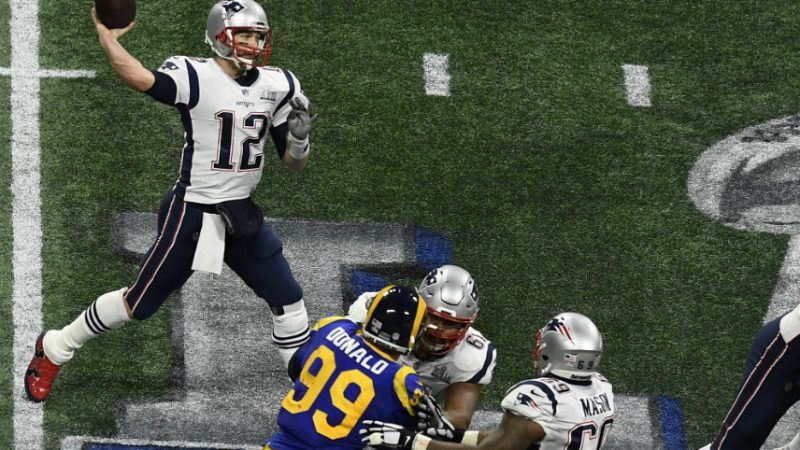How Another Patriots' Super Bowl Victory Explains Anti-Billionaire Politics
Even with all the steps the NFL takes to level the playing field between teams, the Patriots keep rising to the top. It generates some envy, and resentment.

American politics at the moment can pretty much be explained by what you make of the record sixth Super Bowl victory by New England Patriots quarterback Tom Brady, coach Bill Belichick, and owner Robert Kraft.
One view of it is to marvel at, and celebrate, the hard work, risk-taking, and skill that produced the achievement. That's the more conservative view of it.
Another is to complain about it and wish the winning were more evenly distributed. That's the more left-leaning view of it.
President Trump has been cheering on the Patriots. "Never bet against Bob Kraft, Bill Belichick or Tom Brady!" the president tweeted.
Political thinker William Kristol, who isn't often in agreement with Trump, put a certain conservative core on display when, after the Patriots made it into the Super Bowl with an overtime playoff win, Kristol tweeted an excerpt of remarks made by the University of Chicago political philosopher Leo Strauss upon the death of Winston Churchill: "We have no higher duty, and no more pressing duty, than to remind ourselves and our students, of…human greatness, of the peaks of human excellence."
The NFL owners have chosen to organize their affairs in a way that places a priority on equality of opportunity, if not equality of outcome.
National revenue—about $8 billion in 2017—is split evenly among the 32 teams in the league. An inflexible salary cap means that each team is allowed to spend only a set amount on paying players, so richer teams can't win just by paying more for better athletes. The worst team each year gets the first draft pick, and the Super Bowl champion gets the last draft pick.
Even all those steps to level the playing field, though, have not prevented the Patriots from assembling their impressive collection of Super Bowl wins.
This, in turn, generates some envy, or resentment.
The New York Post observed, "Sports fans grow to hate teams that win all the time."
It's a bit like less successful companies complaining about the market power of Facebook, Google, and Amazon, or like socialist politicians such as Senator Bernie Sanders and Rep. Alexandra Ocasio-Cortez complaining about the existence of billionaires. Rather than be impressed by the genius or excellence that led to the business success or the accumulation of wealth, there's an impulse to attack the outcome as evidence of some sort of flaw in the system.
Kraft, who has been attending Patriots games since the 1970s, when the team was mired in mediocrity, seems not particularly troubled by the popular reaction. "For us to get to the point in less than two decades where people are rooting against us because we've won, that's a high-class problem, and I hope we keep it going for quite a while," the Post quoted him as saying.
If some of the proposals being advanced in the political economics sphere—confiscatory taxation imposed on an unpopular minority, for example—were advanced in the football realm, though, Kraft might be less pleased.
This isn't entirely abstract speculation. Politicians can see the parallels, too. A Republican congressman from Texas, Dan Crenshaw, tweeted sarcastically last night, "Should someone propose a 70% tax on the Patriots so that NFL competition is more fair and equal?"
Ocasio-Cortez's policy aide, Dan Riffle, replied that the salary cap is effectively "a 100% tax," and that "the league has revenue-sharing, aka wealth redistribution."
Unless the NFL bans Brady from eating well and exercising, or bans Belichick from watching videos of his competitors' games, there's no way to prevent some inequality. Both Brady and Belichick were football fans at a young age, and they both may have been influenced by their genetic background and their family environment at an early age. They've also been shaped by decades of valuable experience that includes both wins and losses.
Probably the same can be said for the disparate attitudes toward winning and competition that are on display in the reaction to the Patriots victory. They were formed at a young age, accumulated and solidified over time, and there isn't much that can be done about them.
I will say, though, that as a Massachusetts native and sports fan who grew up in the 1970s and 1980s, I used to feel about the Yankees a bit the way a lot of people now feel about the Patriots. My views on the matter of excessive winning in sports have evolved along with improvements in both the Red Sox and the Patriots.
Perhaps, then, the way to cure Bernie Sanders and Alexandra Ocasio-Cortez of their socialism is to make them billionaires. One possible route might be to find a losing professional sports franchise and successfully turn it around into a consistent champion. It is not easy.
Ira Stoll is editor of FutureOfCapitalism.com and author of JFK, Conservative.


Show Comments (183)